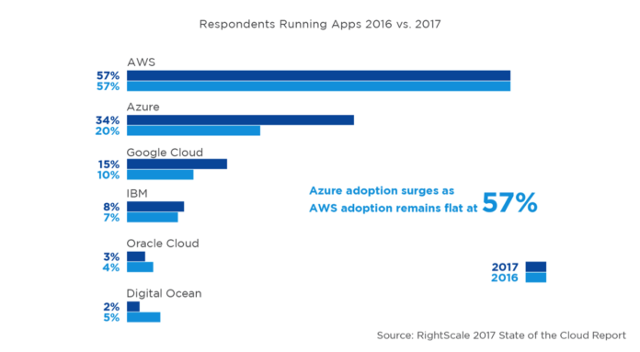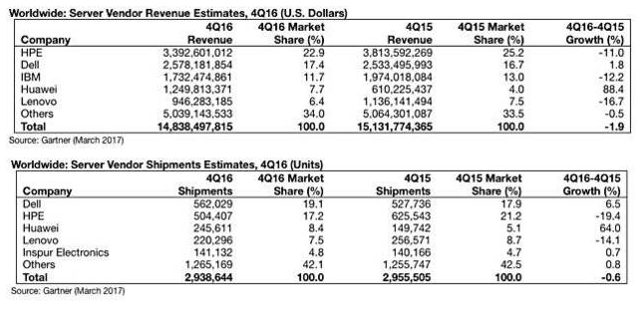
Big blue is having a week. They started with some positive news announcing the acquisition of Verizon’s remaining cloud business, bolstering their customer base. IBM is ending the week on bad news with the announcement that Warren Buffett is selling off 1/3 of his investments in the company.
In an oddly parallel announcement, Oracle announced a strategic partnership with Verizon’s competitor AT&T. The agreement mandates that AT&T say nice things about Oracle in the press… and they have “global access” to Oracle’s cloud offerings.
There were also some industry articles questioning how to best position a company for A.I. use and implementation.
Acquisitions
- Cisco scoops up San Jose software-defined networking startup for $610M (Viptela)
The 170-person company provides a cloud-based to manage wide-area networks that are spread over large geographies or multiple sites.
“Together, Cisco and Viptela will be able to deliver next-generation SD-WAN solutions to best serve all size and scale of customer needs, while accelerating Cisco’s transition to a recurring, software-based business model,” Rob Salvagno, Cisco’s lead executive for M&A, said in a blog post.
http://www.bizjournals.com/sanjose/news/2017/05/01/cisco-viptela-acquisition.html?page=all
- What Apple Can’t Buy
That still leaves a lot to play around with. Net of debt, Apple now sits on $158.3 billion. That would be enough to buy Netflix or Tesla with suitable takeout premiums, to address some of the more recent fantasy matchups. Disney , alas, is currently valued at $181 billion. It is worth reminding that Apple has never done a deal for more than $3 billion, and that was for a nascent music service that also sold overpriced headphones.
- IBM to snap up remnants of Verizon’s cloud business
Verizon Enterprise Solutions on Tuesday said it had reached a deal for IBM to buy its cloud and managed hosting services. It has not revealed the value of the sale, but says it and IBM will be working on “strategic initiatives involving networking and cloud services”.
The sale to IBM marks the end of Verizon’s venture into the cloud infrastructure business, and allows it to focus on reselling datacenter services in conjunction with its own managed network, security, and communications services.
http://www.zdnet.com/article/ibm-to-snap-up-remnants-of-verizons-cloud-managed-hosting-business/
- Oracle and AT&T Enter into Strategic Agreement
The agreement gives AT&T global access to Oracle’s cloud portfolio offerings both in the public cloud and on AT&T’s Integrated Cloud. This includes Oracle’s IaaS, PaaS, Database-as-a-Service (DBaaS), and Software-as-a-Service (SaaS) which will help increase productivity, reduce IT costs and enable AT&T to gain new flexibility in how it implements SaaS applications across its global enterprise. AT&T has also agreed to implement Oracle’s Field Service Cloud (OFSC) to further optimize its scheduling and dispatching for its more than 70,000 field technicians. With OFSC, for example, AT&T will combine its existing machine learning and big data capabilities with Oracle’s technology to increase the productivity, on-time arrivals and job duration accuracy of AT&T’s field technicians.
https://finance.yahoo.com/news/oracle-t-enter-strategic-agreement-130000355.html
Artificial Intelligence
- CEOs rate productivity ‘very low’ from emerging tech
Of those four GPTs, only 2% of the 388 CEOs and senior executives in the survey listed IoT as their top enabling technology for improving productivity, while just 1% of respondents each picked blockchain, 3D printing and A.I. Older and existing technology fared better, with ERP at 10%, following by cloud (7%), analytics (7%), CRM (4%), mobile (3%) and marketing tools (3%). “We notice very low mentions for the four potential breakthrough GPTs,” Raskino noted.
- Can Ansible be the automation platform for the enterprise? Red Hat thinks so
Ansible was founded to provide a new way to think about managing systems and applications that better fit this new world. Historically, management vendors and home-grown scripting solutions were created to manage stacks of software on servers. In contrast, Ansible was created to orchestrate multi-tier applications across clouds. From configuration to deployment to zero-downtime rolling upgrades, Ansible is a single framework that can fully automate today’s modern enteprise apps.
- How Echo Look could feed Amazon’s big data fueled fashion ambitions
Buying clothes is a recurring need; both a practical necessity and a way to keep up with changes in style and taste. Like buying groceries, it’s a type of shopping without end. Which is why Amazon is fixated on both spaces. “In order to be a $200bn company we’ve got to learn how to sell clothes and food,” Jeff Bezos said as long ago as a decade — displaying the long term thinking that has enabled the ecommerce giant to slow-grow its business over more than 20 years from an upstart online bookseller into today’s sprawling digital marketplace whose upwardly thrusting arrow declaims its mission to deliver everything.
- Should your next big hire be a chief A.I. officer?
“A.I. is still immature and evolving quickly, so it is unreasonable to expect everyone in the C-suite to understand it completely,” wrote Andrew Ng, a renowned A.I. scientist, in an article posted in November in the Harvard Business Review. “But if your industry generates a large amount of data, there is a good chance that A.I. can be used to transform that data into value. To the majority of companies that have data but lack deep A.I. knowledge, I recommend hiring a chief A.I. officer or a VP of A.I.”
Cloud
- Google says it doesn’t need to get into a cloud price war with Amazon, Microsoft to win
“We don’t need to compete on price to be honest. We definitely compete on value more than price … but if you look at the products, (they) are hard to compare side by side,” Shaukat told CNBC.
“We believe that our pricing models are much more friendly. So just simply by adopting the more flexible pricing models we have, things like billing by the minute rather than the hour, we think we can save a typical company 20 to 30 percent without having a unit price different to the competition.”
http://www.cnbc.com/2017/05/05/google-cloud-price-battle-amazon-microsoft.html

- Why the Red Hat-Amazon partnership is a big deal in the cloud
Here are the key details: Red Hat announced native access to Amazon Web Services products in its Red Hat OpenShift product. OpenShift is the company’s platform as a service (PaaS) application development software, and it’s also the company’s main tool for helping enterprises deploy application containers, including those from Docker.
Deeper integration between OpenShift and AWS means that OpenShift users can access services such as Amazon Aurora, the company’s cloud-based database, the Amazon RedShift data warehouse product and other cloud-based AWS services directly through OpenShift.
Datacenter/Hardware
- Surface sales sag and Windows Phones fade, as Microsoft’s hardware business takes a hit
Microsoft’s hardware woes contrast sharply with the welfare of the company as a whole, as Microsoft’s cloud services bolstered the bottom line. Microsoft reported profits of $4.8 billion on $22.1 billion in revenue, up 28 percent and 8 percent, respectively, from a year ago. “I’m proud of the progress we’ve made,” said Satya Nadella, chief executive of Microsoft. While the company has repeatedly insisted Windows Phone isn’t dead, however, the slow fade of its own phones doesn’t help the platform’s prospects.
- Windows 10 S laptops won’t let you switch from Edge or Bing
When Microsoft revealed the details of Windows 10 S on Tuesday, it sounded awfully similar to the beleaguered Windows RT. But it looks like there’s a little Windows 8.1 with Bing in there too: Microsoft will not allow Windows 10 S device owners to change the default web browser or the default search engine, as first spotted by The Verge.
That means Microsoft Edge and Bing are the inescapable defaults for Windows 10 S, a stripped-down version of Windows 10 that only allows programs to be downloaded and installed from the Windows Store.
- Dell EMC to launch hybrid Azure cloud stack
The product, which consists of Dell EMC PowerEdge servers and Dell EMC Networking, “delivers a consistent experience across Azure public cloud and private with Azure Stack”, according to the vendor.
It added that the platform also offers a “consistent programming surface between Azure and Azure Stack” so that organisations can create and share traditional and cloud-native applications securely in private and public clouds.
“Cloud is an operating model, not a place, and adopting a hybrid model has become the clear choice,” said Peter Cutts, senior VP, of hybrid cloud platforms at Dell EMC.
Software/SaaS
- Tableau subscription pricing – a proxy for software acquisition
The problem for buyers comes in determining how many licenses to buy. Tableau, like many other vendors, operates a ‘land and expand’ strategy where it gets into a department with a handful of licenses and then seeks to grow that out into the enterprise. It’s a legitimate model but one that Tableau struggled to scale in large enterprise, where the influence of IT is much more important and where Tableau has sometimes come unstuck.
http://diginomica.com/2017/05/04/tableu-things-consider-buying-subscription-pricing/
- Shots fired: IBM and Red Hat vote “no” on Project Jigsaw, may cause delays for Java 9
IBM and Red Hat are just two members of the 25-member Java Community Process Executive Committee. This committee approves all the new Java standards, including major Java versions. These proposals require a 2/3 majority to be passed. Right now, IBM and Red Hat are alone in their public disagreement, but they’re probably not the only ones. Jigsaw’s proposed changes to the Java ecosystem are controversial, to say the least.
https://jaxenter.com/jigsaw-dispute-means-possible-delays-java-9-133723.html
- Does Gartner Group Matter?
Not making it on to the Gartner Magic Quadrant is a very big deal for a software company. That is why software companies pay ridiculous amounts of money to get on (and stay on) the Quadrant. And the fact that Gartner Group accepts money from the companies that are being evaluated, makes their independence very much open to question. And yet, even people like me, who have serious doubts about Gartner’s legitimacy are influenced by the Magic Quadrant more than we would like to admit.
https://www.linkedin.com/pulse/does-gartner-group-matter-kevin-hunt?
- IBM Report Highlights Blockchain’s Value in Healthcare
According to the researchers, blockchain technology offers the industry ” long data” versus “big data ,” that is, data that reaches as far back in time as possible. The potential could capture a patient’s full health history, including every vital sign ever recorded and medicine ever taken.
http://www.nasdaq.com/article/ibm-report-highlights-blockchains-value-in-healthcare-cm782220
Other
- Massive Oracle sales re-org to accelerate cloud cash drive
The re-org has been described as Oracle’s biggest for a decade. From the start of June there will be one account manager for each of Oracle’s Pillar products – database, middleware, BI and hardware. Pillar sales engineers are, as a result, being chopped and will be replaced by a breed of Oracle employee currently in short supply – enterprise cloud architects.
The exact size of the cuts is uncertain, but one report has Oracle preparing to cut up to two-thirds of its current sales force as soon as this summer. Oracle has a total head count of 136,000.
http://www.theregister.co.uk/2017/05/03/oracle_sales_reorganisation/
- Best be Nimble, best be quick. You’re out of a job at HPE
HPE bought Nimble for $1.2bn in March, and a fairly obvious way of making synergies in the acquisition playbook is to absorb Nimble’s engineering organization into its own, but use its existing back office, sales and marketing functions to handle the Nimble products. Then you can lay off unwanted staff and save cost. And lo, it is so.
We’re hearing laid-off execs may get up to a year’s salary plus immediate vesting of some portion their stock options. Folks in the trenches may just get standard redundancy terms. Before it was swallowed by Hewlett Packard Enterprise, Nimble employed roughly 1,100 people.
https://www.theregister.co.uk/2017/05/03/hpe_lays_off_nimble_staff/
- Warren Buffett’s Berkshire Hathaway Cuts IBM Stake by About a Third
Mr. Buffett told CNBC that IBM Chief Executive Ginni Rometty met with him ”a few weeks ago” and asked him about reports that he was selling IBM stock. Mr. Buffett said he confirmed the selling but didn’t provide the rationale or the details.
Berkshire first bought IBM in 2011. Mr. Buffett had avoided technology stocks for years, saying he didn’t understand them. After Berkshire’s IBM stake was first revealed, Mr. Buffett told The Wall Street Journal that IBM “fits all my principles…it’s something we expect to own indefinitely.”
https://www.wsj.com/articles/warren-buffetts-berkshire-hathaway-trims-position-in-ibm-1493956123

Photo: Joshua Ness












